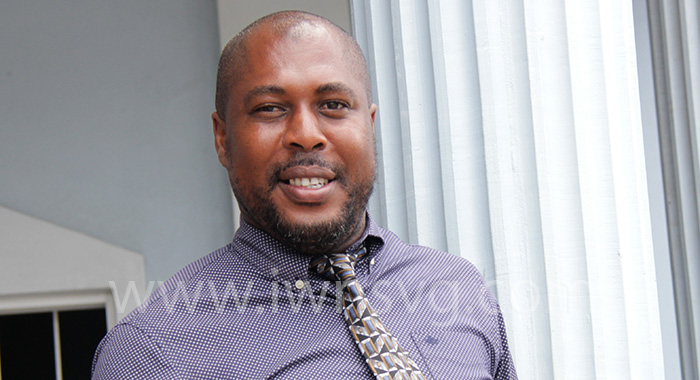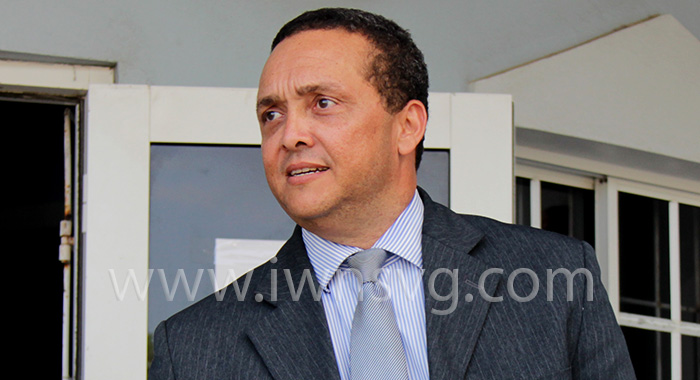A defence counsel has raised questions about the apparent practice of the Office of the Director of Public Prosecution (DPP) to pick and choose which crime scene photographs to disclose to defendants.
The issue surfaced at the Calliaqua Magistrate’s Court on May 10 during the trial of Zackrie Latham, 26, of New Grounds, a former police officer who is charged in connection with the alleged theft of firearms and ammunition from the Georgetown Police Station.
Testifying in the case, detective Corporal 743 Raycon John, told the court that he was the crime scene specialist among officers who responded on June 3, 2021 to a report of a burglary at Georgetown Police Station.
John said that after processing the scene, he returned to the Criminal Records Office (CRO), in Kingstown, removed the memory card from his camera and kept it in his possession.
He later uploaded those images to his computer and prepared a master copy disc of images and also of copies of selected images.
John said that on June 17, about 6 p.m., he was on duty at CRO when Richards came and told him about duty at Calliaqua Police Station.
John said he took his crime scene kit and went there along with Richards and other personnel from the Major Crimes Unit.
On arrival, Richard introduced John to Latham and they had a conversation in the station yard then proceeded to the main road, where Latham pointed them to a purple Marino four-door car parked along the main road.
Richards cautioned Latham then John began to video record the proceedings.
“I can’t recall how long the recording lasted for. I also took digital images of the said vehicle. On completion, we then proceeded to the residence of Latham in Diamond where a search was conducted on his home. Nothing illegal was found,” John said.
He said he later burnt the video recording onto a disc. He also burnt selected photos and the video recording onto one disc and labelled, signed and sealed that disc.
The detective said he would be able to recognise the disc by his handwriting and signature.
However, Connell objected to the prosecutor, Crown Counsel Maria Jackson-Richards’ application to have the disc tendered in evidence.
The lawyer noted that the detective’s evidence was that the disc that he sent to the DPP’s officer was sealed.
Connell said that the disc that was sent to him from the DPP’s office was not sealed.
“My friend’s (the prosecutor’s) submission clearly shows that the disc could be amended, adjusted and tampered with prior to coming to court,” Connell argued.
“Because the only way this (the copy the DPP’s office sent to the defence) can be served on me is if the DPP had access to that (the sealed copy from the detective).
“If the evidence is that one disc was burnt but then I have this, clearly, the evidence in that would be highly prejudicial to the defendant.”

He asked that the disc not be allowed to be tendered in evidence, adding that it is for this same reason that investigators make four copies of the electronic interview.
“The integrity of the evidence must be protected.”
He noted that the disc that the prosecution was attempting to tender in court is sealed.
“But it is sealed by whom?”
Magistrate Zoila Ellis-Browne, who is presiding, asked John to explain who sealed the disc that he had.
“This is my seal. This is sealed by me. This is written up by me,” John said, adding that a copy was also sent to the DPP’s office.
Connell said the disc that the DPP’s office gave to him as part of disclosure was not sealed but the one before the court was sealed.
“The question is, is it one and the same? How would defence counsel know that? How would the court know that? And once evidence can be accessed and tampered with, it would be unsafe and prejudicial to be tendered in this honourable court.”
In response, Jackson-Richards said that if Connell had a problem with the disc being tendered in evidence and his interpretation of the evidence was that John made one copy, although John said he made two, the matter can be resolved through an order of the court that a copy of the sealed disc that John kept in his possession could be made and served on the defence.
Connell said he could not accept that, saying that the disc he had is of the electronic interview and photos on the same disc.
The prosecutor said that what happens from time to time at the DPP’s office “is that there are occasions where disclosure would have been made—”
Connell, however, interrupted her, saying she was giving evidence from the bar table.
He said the prosecution could only submit what is before the court at that moment.
The magistrate asked the prosecutor if she was aware of what is on the disc that was disclosed to Connell.
“It has the information that is on this disc along with the electronic interview,” Jackson-Richards said, adding that it was the second disc that Connell received, one having been disclosed previously.
“In the factual chronology, that happened before the interview…” Connell said, referring to the crime scene photograph. “So how could I get the interview before this, if it wasn’t tampered with?”
The prosecutor said the only things on the disc are the images and the interview.
The court allowed the defence to tender the disc into evidence.
At the close of the prosecution’s case on May 17, the court upheld no-case submission by Connel in relation to 10 of the 13 charges against Latham.
The trial continues on May 30.







Connel seem to really have that judge under his thumb.